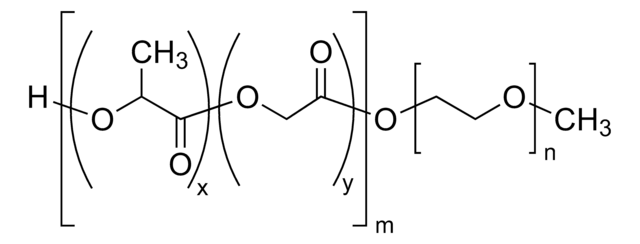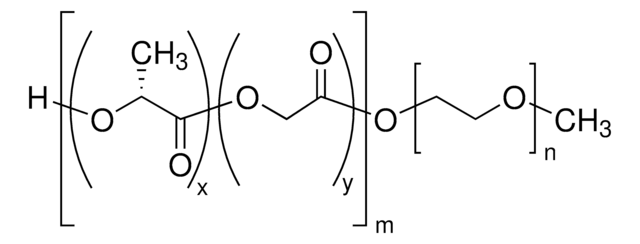925659
Poly(ethylene glycol)-block-poly(lactide-alt-glycolide)
PEG average Mn 5,000, PLGA Mn 15,000
Synonym(s):
PEG-PLGA
Sign Into View Organizational & Contract Pricing
All Photos(1)
About This Item
Linear Formula:
CH3O(C2H4O)n(C5H6O4)mH
UNSPSC Code:
12352112
NACRES:
NA.23
Recommended Products
form
powder, chunks or granules
Quality Level
mol wt
PEG average Mn 5,000
PLGA Mn 15,000
storage temp.
2-8°C
Related Categories
Application
PEG-PLGA, is a biocompatible, amphiphilic block copolymer composed of a hydrophilic PEG block and a hydrophobic poly(lactide-alternative-glycolide) (PLGA) block. These materials have been used in control release and nanoparticle formulation for drug encapsulation and delivery applications.
Different from common Poly(lactide-co-glycolide) (PLGA) polymer, the lactic and glycolic units in Poly(lactide-alt-glycolide) block alternate in sequence in the polymer chain, and the molar ratio of lactic to glycolic units in the polymer is exactly 1:1.
Poly(lactide-alt-glycolide) exhibits excellent solubility in common organic solvents, such as acetonitrile, acetone, dioxane, DCM, and THF, providing great convenience for drug delivery researches and applications.
Different from common Poly(lactide-co-glycolide) (PLGA) polymer, the lactic and glycolic units in Poly(lactide-alt-glycolide) block alternate in sequence in the polymer chain, and the molar ratio of lactic to glycolic units in the polymer is exactly 1:1.
Poly(lactide-alt-glycolide) exhibits excellent solubility in common organic solvents, such as acetonitrile, acetone, dioxane, DCM, and THF, providing great convenience for drug delivery researches and applications.
Storage Class
11 - Combustible Solids
wgk_germany
WGK 3
flash_point_f
Not applicable
flash_point_c
Not applicable
Certificates of Analysis (COA)
Search for Certificates of Analysis (COA) by entering the products Lot/Batch Number. Lot and Batch Numbers can be found on a product’s label following the words ‘Lot’ or ‘Batch’.
Already Own This Product?
Find documentation for the products that you have recently purchased in the Document Library.
Lin Yu et al.
Biomacromolecules, 12(4), 1290-1297 (2011-03-03)
This paper reports the influence of sequence structures of block copolymers composed of poly(lactic acid-co-glycolic acid) (PLGA) and poly(ethylene glycol) (PEG) on their thermogelling aqueous behaviors. A series of thermogelling PLGA-PEG-PLGA triblock copolymers with similar chemical compositions and block lengths
Our team of scientists has experience in all areas of research including Life Science, Material Science, Chemical Synthesis, Chromatography, Analytical and many others.
Contact Technical Service





